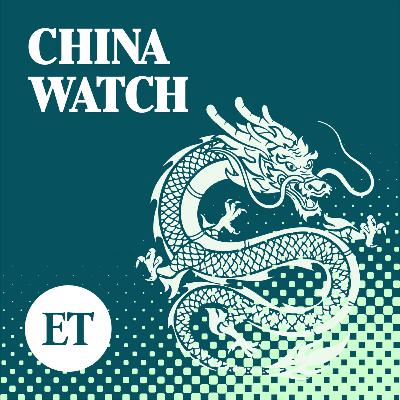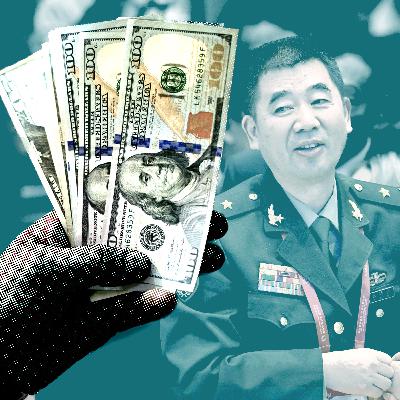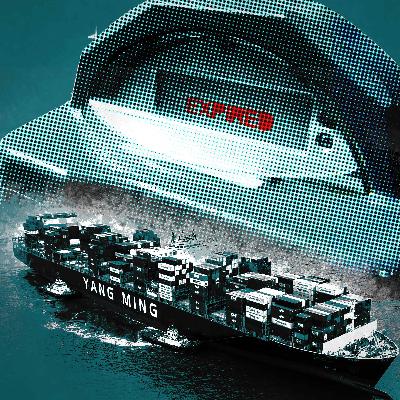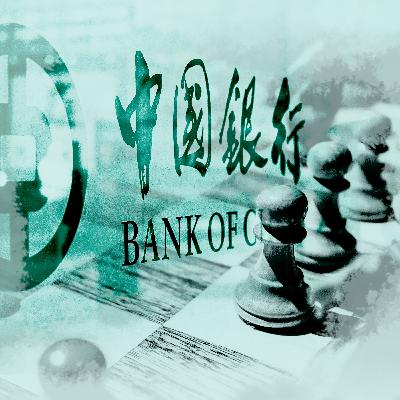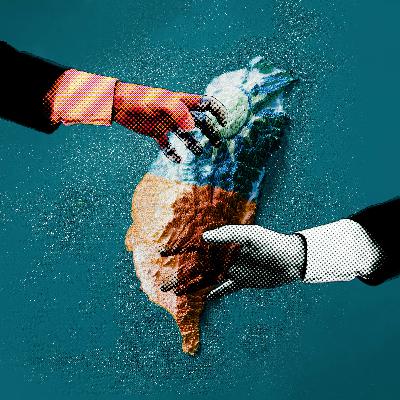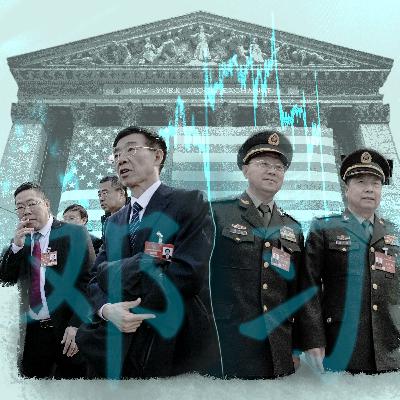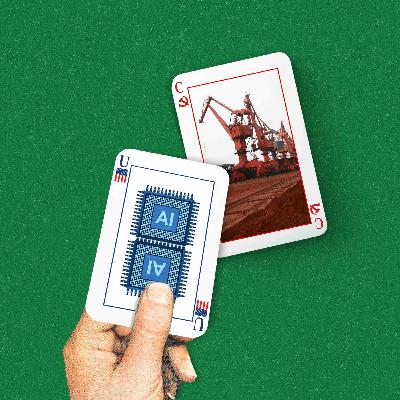Discover China Watch
China Watch

China Watch
Author: The Epoch Times
Subscribed: 28Played: 329Subscribe
Share
© The Epoch Times
Description
“China Watch” is a weekly deep dive that pulls back the curtains on one of the world's most enigmatic powers. Join Epoch Times contributor Terri Wu as she deciphers where China is headed next and how its politics, technology, and business affect Americans.
50 Episodes
Reverse
While much of the international news focuses on what is happening in Iran, other moving pieces in the region will play additional critical roles in America's future foreign business efforts. And there are consequences for China as well.Listen as Terri and Daniel discuss how America is expanding into its last “Economic Frontier,” which counters many of the power players in the area. Learn how this concept exists as a “Dragon Vein” for both China and the United States, and what having it, or losing it, means.Views expressed in this episode are opinions of the host and guests and do not necessarily reflect the views of The Epoch Times.—Terri Wu is a Washington-based freelance reporter for The Epoch Times covering education and China-related issues. Send tips to terri.wu@epochtimes.com.Enjoyed this podcast? Follow China Watch for a peek behind the red curtain.
China proudly holds a total global monopoly on critical minerals—at least, that’s what they’d like you to think.As one of this week’s experts explains, “And as long as the perception of dominance remains, dominance remains.” And that is the case for China in terms of its control on this important product, a “smoke-and-mirror” monopoly.Daniel and Terri first examine why early reactions to the Supreme Court’s decision striking down Trump-era tariffs may be overstating the impact—particularly when it comes to China.Then they turn to a deeper shift underway: why China’s control of the global supply chain of critical minerals is slipping.This is the analysis you hear first on China Watch.Related Report: Here’s How a New US-Led Mineral Alliance Could Sideline China (Read)Views expressed in this episode are opinions of the host and guests and do not necessarily reflect the views of The Epoch Times.—Terri Wu is a Washington-based freelance reporter for The Epoch Times covering education and China-related issues. Send tips to terri.wu@epochtimes.com.Enjoyed this podcast? Follow China Watch for a peek behind the red curtain.
Happy Lunar New Year! The year of the Horse has arrived, and so has a new co-host for this week’s episode.Show producer Daniel Holl joins Terri this week for a more lighthearted discussion on Chinese propaganda. That is, the kind that takes movie form, which can be unintentionally comical to a non-Chinese audience.And if you noticed issues with Daniel’s audio, he’ll have them fixed for next week’s show! Let us know what you think of the co-host dynamic.Views expressed in this episode are opinions of the host and guests and do not necessarily reflect the views of The Epoch Times.—Terri Wu is a Washington-based freelance reporter for The Epoch Times covering education and China-related issues. Send tips to terri.wu@epochtimes.com.Enjoyed this podcast? Follow China Watch for a peek behind the red curtain.
The Panama Canal, the Board of Peace, and the Critical Minerals Ministerial seem to be unrelated projects, but they’re all coordinated moves against the Chinese Communist Party.Listen to Terri Wu connect these seemingly unrelated dots to explain how they’re part of a broader geopolitical strategy by the United States to address Chinese influence and how the interconnectedness is working in the broader interests of the West.Views expressed in this episode are opinions of the host and guests and do not necessarily reflect the views of The Epoch Times.—Terri Wu is a Washington-based freelance reporter for The Epoch Times covering education and China-related issues. Send tips to terri.wu@epochtimes.com.Enjoyed this podcast? Follow China Watch for a peek behind the red curtain.
Greenland stands at the center of a global power struggle between the United States and an aggressive China. Both countries have been jockeying to assert influence on the island, with U.S. President Donald Trump recently taking a decisive lead.What is the significance of the island to each of these countries? Why does the European Union take a contrary stance to Trump?Find out with Terri Wu and her group of select experts on this week’s episode of China Watch.Views expressed in this episode are opinions of the host and guests and do not necessarily reflect the views of The Epoch Times.—Terri Wu is a Washington-based freelance reporter for The Epoch Times covering education and China-related issues. Send tips to terri.wu@epochtimes.com.Enjoyed this podcast? Follow China Watch for a peek behind the red curtain.
China has been pursuing a long-term strategy to position itself along key geographic and economic chokepoints surrounding the United States. It’s a long game, with a metaphorical example in one of the country's oldest and most famous games: Weiqi.While it’s often a strategy to encircle the opponent without them realizing it, it seems China has been caught out this time. That may be the reason why U.S. President Donald Trump has been so dedicated to acquiring Greenland, in part or in full.Listen to the history behind the massive, sparsely inhabited island and how China had been planning to use it in its campaign against the United States.Views expressed in this episode are opinions of the host and guests and do not necessarily reflect the views of The Epoch Times.—Terri Wu is a Washington-based freelance reporter for The Epoch Times covering education and China-related issues. Send tips to terri.wu@epochtimes.com.Enjoyed this podcast? Follow China Watch for a peek behind the red curtain.
U.S. President Donald Trump has called for “new leadership in Iran.”The country’s economy is on the brink of collapse. What began as an economic protest quickly escalated into a nationwide anti-regime movement.Iran’s nuclear capabilities and terrorist proxies have also been significantly diminished, and the Islamic regime appears to be more fragile than ever before during its rule since 1979.What does that mean for China? Many focus on the oil trade between Iran and China, as China buys the majority of Iran’s sanctioned oil.Terri Wu spoke with experts who pointed out deeper strategic concerns Beijing holds in Iran.Views expressed in this episode are opinions of the host and guests and do not necessarily reflect the views of The Epoch Times.—Terri Wu is a Washington-based freelance reporter for The Epoch Times covering education and China-related issues. Send tips to terri.wu@epochtimes.com.Enjoyed this podcast? Follow China Watch for a peek behind the red curtain.
In the aftermath of former Venezuelan leader Nicolás Maduro’s capture by the U.S. military, a wide range of questions have gone unanswered.One of those is the role Chinese defense equipment may have played in letting the United States complete its mission unharmed.Venezuela operates Chinese-built radar systems that Beijing has long advertised as capable of neutralizing U.S. stealth advantages.Epoch Times reporter Sean Tseng joins Terri Wu to examine what “Operation Absolute Resolve” reveals—and what remains uncertain—about China’s military capabilities.Views expressed in this episode are opinions of the host and guests and do not necessarily reflect the views of The Epoch Times.—Terri Wu is a Washington-based freelance reporter for The Epoch Times covering education and China-related issues. Send tips to terri.wu@epochtimes.com.Enjoyed this podcast? Follow China Watch for a peek behind the red curtain.
For one of the rare times in recent history, the Chinese Communist Party has not been in lockstep across its branches in external activities. While rhetoric in 2025 was toned down from outwardly aggressive to friendly and businesslike, the military has been more provocative than ever.The direct threats to America and its allies in the East seem to disconnect with China’s need for economic partners. Listen as Terri Wu describes what may be causing the schism, and what it means for us in the United States.Views expressed in this episode are opinions of the host and guests and do not necessarily reflect the views of The Epoch Times.—Terri Wu is a Washington-based freelance reporter for The Epoch Times, covering education and China-related issues. Send tips to terri.wu@epochtimes.com.Enjoyed this podcast? Follow China Watch for a peek behind the red curtain.
When you think of a spy, do you think of a military officer who is a master of languages and disguise? If you do, then you may not understand how China uses its massive web of spies throughout the United States.Instead, think professors, white-collar workers, engineers, and researchers. They aren’t professional spies, but their loyalty to the Chinese regime runs deep.Hear Terri Wu’s in-depth discussion with a former federal and CIA employee, who now focuses his research on China’s espionage practices, and learn the details of the tactics that the regime uses, most of which would never even cross the mind of the average American.Views expressed in this episode are opinions of the host and guests and do not necessarily reflect the views of The Epoch Times.—Terri Wu is a Washington-based freelance reporter for The Epoch Times covering education and China-related issues. Send tips to terri.wu@epochtimes.com.Enjoyed this podcast? Follow China Watch for a peek behind the red curtain.
The second Trump Administration published its first National Security Strategy document this month, and it’s a far departure from what the world has seen in recent years.While it adopts a much more business-like tone than before, some analysts say it’s an indicator of a weak United States. Is that the case? And what implications does the new foreign policy vision have on U.S.–China relations?Listen to Terri Wu and the experts she interviewed on the new National Security Strategy, which may set the tone for decades.Views expressed in this episode are opinions of the host and guests and do not necessarily reflect the views of The Epoch Times.—Terri Wu is a Washington-based freelance reporter for The Epoch Times covering education and China-related issues. Send tips to terri.wu@epochtimes.com.Enjoyed this podcast? Follow China Watch for a peek behind the red curtain.
How would one infiltrate a foreign government? It seems like the idea would be to go straight to the top, but a recent trial in New York suggests otherwise.Reporter Nick Zifcak has been covering the New York trial case of Linda Sun, who is accused of acting secretly as an agent of the CCP.Hear how she got into her position, who she worked for, everything she is accused of doing, and her side of the story.Views expressed in this episode are opinions of the host and guests and do not necessarily reflect the views of The Epoch Times.—Terri Wu is a Washington-based freelance reporter for The Epoch Times covering education and China-related issues. Send tips to terri.wu@epochtimes.com.Enjoyed this podcast? Follow China Watch for a peek behind the red curtain.
Japan has a new prime minister, and she’s upending the political tradition that has guided geopolitics in the Indo-Pacific region.China is already dealing with the chaos imposed by President Donald Trump’s trade tactics. Now, it has the added pressure from Sanae Takaichi, the Iron Lady of Japan.Listen as Terri hears from experts, including one who attended the same prestigious institute as Takaichi. Learn what to watch for and analyze for China’s hegemony, or lack thereof, in the future.Views expressed in this episode are opinions of the host and guests and do not necessarily reflect the views of The Epoch Times.—Terri Wu is a Washington-based freelance reporter for The Epoch Times covering education and China-related issues. Send tips to terri.wu@epochtimes.com.Enjoyed this podcast? Follow China Watch for a peek behind the red curtain.
The financial information of Chinese companies is a black box. Yet these companies enjoy preferential access to U.S. capital markets.How did it happen, and why was it tolerated?For decades, China has been taking advantage of leniency and the openness of America’s market system. And it’s coming to a point where action needs to be taken.Join Terri as she analyzes the predatory investment tactics China has used to intertwine itself with the U.S. economy and reap benefits in an all-too-cunning manner.Views expressed in this episode are opinions of the host and guests and do not necessarily reflect the views of The Epoch Times.—Terri Wu is a Washington-based freelance reporter for The Epoch Times covering education and China-related issues. Send tips to terri.wu@epochtimes.com.Enjoyed this podcast? Follow China Watch for a peek behind the red curtain.
Although a new trade truce was set, most analysts overlooked one critical part of the agreement.That agreement is all about shipping. But its broader consequence is global control over the oceans and seas. And whoever controls the waters will become the leading world power.Now that China is the top ship builder in the world, by a large measure, what does that mean for the United States?Join Terri as she connects the dots on how the United States is countering the Chinese regime's massive shipbuilding capacity, both domestically and through its allies.Views expressed in this episode are opinions of the host and guests and do not necessarily reflect the views of The Epoch Times.—Terri Wu is a Washington-based freelance reporter for The Epoch Times covering education and China-related issues. Send tips to terri.wu@epochtimes.com.Enjoyed this podcast? Follow China Watch for a peek behind the red curtain.
It almost sounds like tabloid gossip to say, “Wow, Chinese leader Xi Jinping said something nice about President Donald Trump!”If it were any other political circumstance, it may just be gossip, but this is coming from the head of the Chinese Communist Party, who, according to one expert, has never uttered such words about any American president.What is the significance of that, and especially at this time? And even more importantly, who won this round of trade talks, and how can we be sure?Find out as Terri explains and hears from experts in this episode of China Watch.Views expressed in this episode are opinions of the host and guests and do not necessarily reflect the views of The Epoch Times.—Terri Wu is a Washington-based freelance reporter for The Epoch Times covering education and China-related issues. Send tips to terri.wu@epochtimes.com.Enjoyed this podcast? Follow China Watch for a peek behind the red curtain.
It’s easy to say that another country is weak, vulnerable, or unable to win in a confrontation. But what about when those claims are backed up by concrete numbers?In this episode, Terri converses with Alexander Campbell, who has an extensive history in global macro investing and a penchant for analyzing both numbers and strategy. In his book “China Can’t Win,” he describes through various lenses, such as Game Theory methodology and hedge fund experience, how one can conclude that the Chinese Communist Party is more economically vulnerable than it’s letting on.Find more about this episode’s guest on Alexander Campbell’s Substack.Views expressed in this episode are opinions of the host and guests and do not necessarily reflect the views of The Epoch Times.—Terri Wu is a Washington-based freelance reporter for The Epoch Times covering education and China-related issues. Send tips to terri.wu@epochtimes.com.Enjoyed this podcast? Follow China Watch for a peek behind the red curtain.
Desperate times call for desperate measures. And what may be the key to U.S.–China relations now and in the future is the temptation for both sides in the Pacific Ocean.Join Terri as she discusses the significance of the island of Taiwan, and how important it is to both the United States and the Chinese Communist Party. Here’s a hint: It’s not about semiconductors.Find out what’s at stake for the future of both leaders and countries in this episode of “China Watch.”Views expressed in this episode are opinions of the host and guests and do not necessarily reflect the views of The Epoch Times.—Terri Wu is a Washington-based freelance reporter for The Epoch Times covering education and China-related issues. Send tips to terri.wu@epochtimes.com.Enjoyed this podcast? Follow China Watch for a peek behind the red curtain.
A hallmark of communist rule is constant internal struggle and infighting. And it’s not just person to person, it’s entire groups, like gang warfare hidden beneath the veneer of unification.And while knowing that fighting may be interesting in and of itself, those conflicts can now directly impact the money of Americans. Listen as Terri Wu describes who the factions are, and how they battle for territory and control, like martial artists in underground fighting rings, and most importantly, how those fights are impacting U.S. markets, and how China watchers can know what to keep their eyes peeled for.Views expressed in this episode are opinions of the host and guests and do not necessarily reflect the views of The Epoch Times.—Terri Wu is a Washington-based freelance reporter for The Epoch Times covering education and China-related issues. Send tips to terri.wu@epochtimes.com.Enjoyed this podcast? Follow China Watch for a peek behind the red curtain.
China has chosen to play hardball with the United States, using its biggest trade weapon—rare earths.Join Terri as she deciphers the sudden escalation in the U.S.–China trade war and Beijing’s motivation behind it.What does this mean for the U.S. tech sector? Why did it happen during the government shutdown? And will the U.S. response be enough?Views expressed in this episode are opinions of the host and guests and do not necessarily reflect the views of The Epoch Times.—Terri Wu is a Washington-based freelance reporter for The Epoch Times covering education and China-related issues. Send tips to terri.wu@epochtimes.com.Enjoyed this podcast? Follow China Watch for a peek behind the red curtain.








